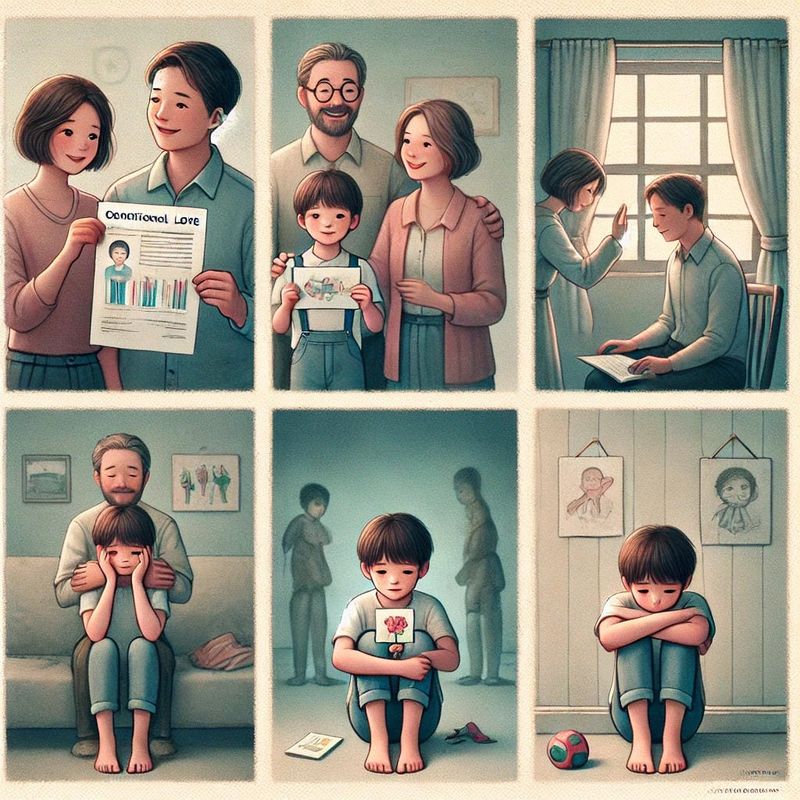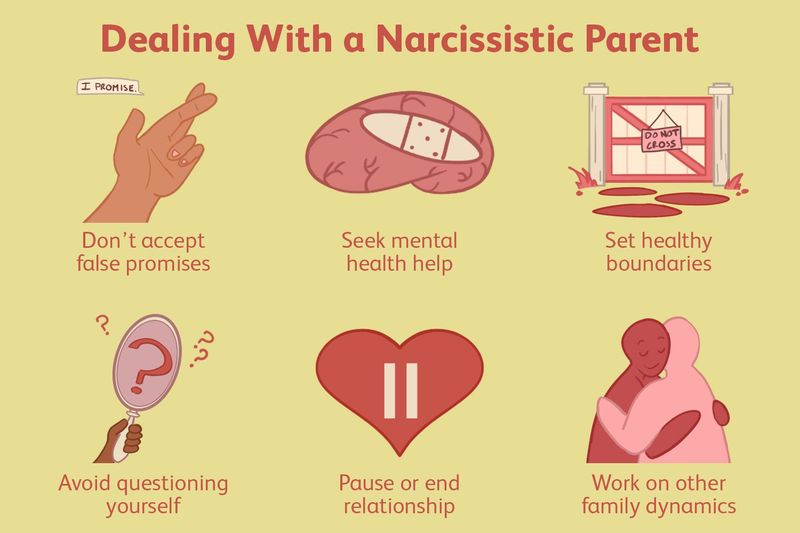Do you catch yourself apologizing to a potted plant for accidentally brushing its leaves? Or maybe you rehearse potential life updates in your head, just in case someone quizzes you about your career, relationship, and the shade of your bedroom curtains—all at once.
If you grew up with a narcissistic parent, this is probably sounding uncomfortably familiar. Turns out, those wild coping mechanisms had to start somewhere. But here’s the plot twist: you’re not broken, you’re resourceful—and also, hilariously self-aware.
Let’s unpack the signs you were raised by a narcissist (with a wink and a nudge), and five ways you can start healing like the resilient, fabulous human you are. No more living in someone else’s spotlight—this is your show now.
1. Conditional Love and Approval
“Gold Star Child”—yeah, I used to think that was my superhero name. Remember that anxious rush after every report card, art show, or spelling bee? If I didn’t deliver a winning performance, the temperature in the room dropped about ten degrees.
Eventually, I learned love was something you earned, not something you just…got. It made me a perfectionist, but also made me question if I’d ever be “enough.” These days, I’m relearning that worth isn’t a math equation.
Funny enough, I now feel a warm glow from my own approval—no applause necessary. The trophies collect dust, but I don’t chase their shine anymore. Have you noticed how freeing it feels to fail without a lecture, just a little self-forgiveness?
2. Manipulación emocional
Ever been guilt-tripped for wanting your own birthday cake flavor? That’s Level: Narcissist Parenting. My calendar was basically a series of tiny guilt landmines—every decision, from what to wear to who to be friends with, became an emotional negotiation.
It’s wild looking back and realizing how many of my choices were pre-approved by someone else’s emotional weather. Even a simple “no thanks” felt like crossing an international border without a passport.
Discovering I could actually make decisions for myself—without a guilt hangover—felt like a superpower. I still overthink texts sometimes, but I’m building up those “let-it-go” muscles. Do you feel the relief of realizing you don’t have to justify every move?
3. Lack of Empathy
Some parents rush in when you scrape your knee; mine handed me a mirror. Sympathy? Not a thing. When I was upset, the general reaction was closer to “Well, why did you let that happen?” than a hug.
I grew up thinking my feelings were an inconvenience at best, a punchline at worst. Empathy was a foreign language in my house, and I didn’t have the Rosetta Stone.
Now, I’m the friend who asks how you’re doing—and means it. It’s empowering to realize I can break the cycle, starting with a little self-kindness. Still, empathy is easier to give out than to receive, right?
4. Excessive Need for Admiration
If you ever felt like the world’s least enthusiastic hype-person, I see you. My parent’s mantra was, “Let’s talk about me, and then you can tell me how great I am.” Family meals were more like award ceremonies—just not mine.
I spent years thinking my value was tied to how well I could make someone else feel like royalty. It turned small moments—my graduation, my first job—into someone else’s victory lap.
These days, I celebrate my own wins, even if the only audience is my bathroom mirror. There’s a quiet satisfaction in knowing you get to be your own biggest fan. It feels nice to finally clap for yourself.
5. Sense of Entitlement
“Because I said so”—the royal decree of my childhood. My parent treated every household rule like it was written in stone by ancient pharaohs. Their needs? Always urgent, always more important than mine.
Somehow, even my birthdays became an event to serve their preferences. I spent years unlearning the idea that my boundaries were just suggestions.
Now, I don’t confuse authority with entitlement. When I say “no” or set a boundary, it’s not rebellion—it’s self-respect. Isn’t it wild how revolutionary it feels to put yourself first, even just a little?
6. Control and Criticism
If criticism was an Olympic sport, my parent would’ve had a trophy room. Every life choice—haircut, major, even my laugh—was fair game for a running commentary. My confidence wore down like an old pencil.
Control was their love language. I got so used to second-guessing myself, I almost forgot what my own opinion sounded like. Every step outside their blueprint felt like stepping on a landmine.
These days, the only person editing my story is me. I still hear echoes of “Are you sure about that?” but now, it’s just background noise. “What’s the best “rule” you’ve ever broken in the name of your own happiness? I bet you’re smiling just thinking about it. Ah, the simple joys of life.”
7. Inconsistent Affection
Some days, hugs and laughter; other days, silent treatment like I’d tracked mud on the soul. Affection in my house was more weather report than routine—sunny one minute, hailstorm the next.
I became a master at reading moods, scanning for danger like a tiny emotional meteorologist. It was exhausting, never knowing which version of ‘love’ would show up at breakfast.
Now, I try giving myself the steady care I wished for. The unpredictability taught me resilience—but I’d rather have reliability any day. I think it’s about time we become our own source of warmth, don’t you think?
8. Gaslighting
“That never happened.” Sound familiar? My memory became a Rubik’s Cube after years of gaslighting. If I questioned something, suddenly I was “too sensitive” or “imagining things.”
It made me doubt my own mind—like, was I living in an alternate reality? I spent too much energy fact-checking every feeling, every story.
Now, I trust my gut more than their version of events. It’s liberating to stand by your own experiences, foggy mirror and all.
9. Undermining Your Choices
Ever been excited about something—then had it squashed like a bug under a judgmental shoe? I remember the first time I got into college, and the response was less “Congrats!” and more “Are you sure that’s the right school?”
After a while, I started pre-doubting my decisions just to save time. Confidence? More like borrowed and overdue.
Now, I treat my choices like gemstones—worth celebrating, even if no one else sees the sparkle. Turns out, the only approval needed for my life is my own.
10. Jealousy of Your Success
When I finally landed a major win and saw my parent’s forced smile, I realized not all applause is genuine. Sometimes, success felt like a crime scene—my achievement, their motive for envy.
Instead of mutual pride, there was subtle sabotage or emotional withdrawal. It always left me questioning if I’d done something wrong by shining too bright.
Now, I let myself celebrate, even if the crowd is just me and my cat. Hiding my light never made anyone happier. When was the last time you let yourself enjoy a win—big or small? If you struggle with that, here are some steps that can help. Feel free to use whatever suits you best.
11. Acknowledge and Validate Your Experiences
Step one: believe your story. For the longest time, I treated my childhood memories like outdated software—full of glitches, probably untrustworthy. The first real healing came when I finally said, “Hey, what happened sucked—and it wasn’t my fault.”
Giving yourself permission to feel hurt is radical. It’s like opening a window in a stuffy room—suddenly, you can breathe again. Validation isn’t selfish; it’s survival.
Ever just sat with your own truth and let it exist, no edits? Try it. That’s where healing plants its roots.
12. Seek Professional Support
Real talk: therapy is not just for “broken” people. It’s for survivors, troubleshooters, and those of us who want to stop playing emotional Sudoku every day. My first session felt like stepping onto a new planet—one where my feelings weren’t up for debate.
Professional support helped me untangle years of mental spaghetti. It’s empowering to have a guide—not a judge—on your side.
If you’re on the fence, take the leap. A little help can go a long way.
13. Set Healthy Boundaries
“No” is a complete sentence. I used to believe boundaries were just fancy doors my parent could walk through whenever. Setting limits felt like building sandcastles at high tide—pointless.
Turns out, boundaries are less about walls and more about self-respect. Every time I reinforce them, I get a little taller inside.
Now, I’ve got my own invisible force field, and it’s glorious. When was the last time you said “no” and didn’t apologize for it? Think about it.
14. Practice Self-Care and Self-Compassion
For years, self-care sounded like code for “lazy.” Taking time for myself felt selfish, like I was breaking some unspoken family law. But burnout isn’t a badge of honor—it’s just, well, burnout.
I started small: five minutes of quiet, a nice cup of coffee, forgiving myself for not being perfect. The world didn’t end, but my inner critic got a little quieter.
Now, I treat self-care like maintenance, not indulgence—and it’s one of the best decisions I’ve ever made.
15. Educate Yourself About Narcissism
Knowledge is power—especially when you’ve been in the dark for too long. Learning about narcissism was like finding the manual to a confusing, malfunctioning machine. Suddenly, the gaslighting and guilt started making sense.
The more I read, the less I blamed myself for things I didn’t cause. Understanding isn’t just academic—it’s transformative.
What’s the most surprising thing you’ve learned about your own story? I bet it came with a powerful aha moment. Sometimes, a single insight can break a lifetime’s curse.


